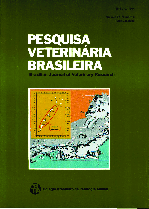 |
|
|
|
Year 2002 - Volume 22, Number 4
|

|
A Brazilian glycoprotein E-negative bovine herpesvirus type 1.2a (BHV-1.2a) mutant is attenuated for cattle and induces protection against wild-type virus challenge, 22(4):135-140
|
ABSTRACT.- Franco A.C., Spilki F.R., Esteves P.A., Lima M., Weiblen R., Flores E.F., Rijsewijk F.A.M. & Roehe P.M. 2002. A Brazilian glycoprotein E-negative bovine herpesvirus type 1.2a (BHV-1.2a) mutant is attenuated for cattle and induces protection against wild-type virus challenge. Pesquisa Veterinária Brasileira 22(4):135-140. [Um mutante gE-negativo de herpesvírus bovino tipo 1.2a é atenuado para bovinos e induz proteção frente ao desafio com vírus de campo.] Centro de Pesquisas Veterinárias Desidério Finamor, Fepagro-Saúde Animal, Cx. Postal 2076, Porto Alegre, RS 90001-970, Brazil. E-mail: proehe@ufrgs.br
The authors previously reported the construction of a glycoprotein E-deleted (gE·) mutante of bovine herpesvirus type 1.2a (BHV-1.2a). This mutant, 265gE·, was designed as a vacinal strain for differential vaccines, allowing the distinction between vaccinated and naturally infected cattle. In order to determine the safety and efficacy of this candidate vaccine virus, a group of calves was inoculated with 265gE·. The virus was detected in secretions of inoculated calves to lower titres and for a shorter period than the parental virus inoculated in control calves. Twenty one days after inoculation, the calves were challenged with the wild type parental virus. Only mild signs of infection were detected on vaccinated calves, whereas nonvaccinated controls displayed intense rhinotracheitis and shed virus for longer and to higher titres than vaccinated calves. Six months after vaccination, both vaccinated and control groups were subjected to reactivation of potentially latent virus. The mutant 265gE· could not be reactivated from vaccinated calves. The clinical signs observed, following the reactivation of the parental virus, were again much milder on vaccinated than on non-vaccinated calves. Moreover, parental vírus shedding was considerably reduced on vaccinated calves at reactivation. In view of its attenuation, immunogenicity and protective effect upon challenge and reactivation with a virulent BHV-1, the mutant 265gE· was shown to be suitable for use as a BHV-1 differential vaccine vírus. |
| |
|
|
| |
|
 |